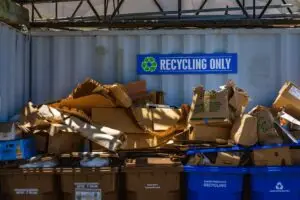Understanding current scrap metal prices
Scrap metal prices fluctuate based on supply and demand in the market. Copper, aluminum, and steel are some common types of scrap metal. The value of scrap metal is influenced by factors like economic conditions, global trade, and industrial activity. To stay updated on current scrap metal prices, businesses can use online resources like scrap metal pricing websites or contact local scrap yards for pricing information. Understanding the market trends can help businesses make informed decisions when buying or selling scrap metal.

Factors influencing scrap metal prices
Scrap metal prices are influenced by various factors, including global economic conditions, supply and demand, and the metal’s type and quality. Other factors influencing scrap metal prices can include:
- Market Demand: The higher the demand for scrap metal, the higher the prices will be.
- Economic Conditions: During economic downturns, scrap metal prices tend to decrease due to reduced manufacturing and construction activities.
- Competition: The number of buyers and sellers of scrap metal in the market can also impact prices.
- Government Policies: Tariffs, trade agreements, and environmental regulations can all affect scrap metal prices.
- Geopolitical Events: Political instability, wars, and natural disasters can disrupt the supply chain and influence scrap metal prices.
Importance of monitoring scrap metal prices
Monitoring scrap metal prices is crucial for businesses that deal with scrap metal. By staying informed about price fluctuations, businesses can make more accurate decisions on when to buy or sell scrap metal, maximizing their profits. The prices of scrap metal can vary daily due to market demand, changes in global economy, and industry trends. Keeping a close eye on these prices enables businesses to adapt their strategies accordingly, ensuring they capitalize on the best market opportunities.
Strategies for maximizing profit with current scrap metal prices
When aiming to maximize profit with current scrap metal prices, consider buying in bulk to benefit from volume discounts. Sort your scrap metals efficiently to ensure you receive the best possible prices. Research current market trends to help you make informed selling decisions. Maintain good relationships with scrap metal buyers to potentially negotiate better prices. Finally, regularly review and adjust your strategies to adapt to market changes and optimize your profits.
Building relationships with scrap metal buyers
Maintaining good relationships with scrap metal buyers is crucial for consistent business. By being reliable and communicative, you can establish trust with buyers. This can lead to better pricing deals, timely payments, and a smoother overall transaction process. Remember, a strong relationship can result in repeat business and referrals to other potential buyers in the industry.
Efficient ways to collect and sort scrap metal
To efficiently collect and sort scrap metal, it’s essential to have a well-organized system in place. Here are some tips to help you make the most of current scrap metal prices:
- Separate metals by type: Divide your scrap metal into different categories like aluminum, copper, steel, and brass to streamline the sorting process.
- Invest in quality containers: Use sturdy containers or bins to store and transport the different metal types, keeping them separate to maximize their value.
- Regular maintenance: Regularly clean and maintain your scrap metal collection area to prevent contamination and ensure higher prices when you sell.
- Stay informed: Keep up-to-date with current scrap metal prices and market trends to know when the best time is to sell your materials for maximum profit.
- Build relationships: Establish good relationships with scrap yards and metal recyclers to secure better prices and more opportunities for selling your scrap metal.
Tools and equipment for scrap metal management
When managing scrap metal, having the right tools and equipment is key. Some essential items to consider for effective scrap metal management are:
- Magnets: Useful for separating ferrous metals from non-ferrous metals.
- Cutting tools: Such as shears or a cutting torch, to break down larger pieces of metal.
- Containers: Whether bins, drums, or even portable dumpsters, having proper storage is crucial.
- Safety gear: Including gloves, goggles, and protective clothing to ensure safety when handling metal.
- Scale: To accurately weigh and measure the scrap metal for pricing.
- Transportation: Whether a truck, van, or trailer, you need a reliable way to transport the scrap to buyers or recycling facilities.
By having these tools at your disposal, you can streamline your scrap metal management process and maximize your profits.
Safety considerations when dealing with scrap metal
Always prioritize safety when dealing with scrap metal. Here are some key considerations to keep in mind:
- Wear appropriate protective gear such as gloves, goggles, and sturdy footwear to prevent injuries.
- Inspect the metal for hazards like sharp edges, rust, or potential contaminants before handling it.
- Use the correct tools for the job to avoid accidents or damaging the metal.
- Keep your work area clean and organized to prevent trips, slips, and falls.
- Be cautious when handling heavy or bulky metal pieces to avoid strain or injury.
Remember, safety first!
Sustainable practices in scrap metal recycling
Recycling scrap metal helps reduce waste and preserves natural resources. Sustainable practices in scrap metal recycling involve finding ways to recycle metal efficiently while minimizing harm to the environment. Some tips include sorting metals before recycling, using energy-efficient processes, and reusing recycled metals in new products whenever possible. By adopting sustainable practices, businesses can contribute to a cleaner environment and also save on raw material costs in the long run.
Conclusion and key takeaways
Before we wrap up, let’s go over some key points to remember from this blog post about scrap metal prices. Here are the main takeaways:
- Keep a close eye on the market trends and fluctuations
- Always stay informed about the current prices and demand for different types of scrap metal
- Establish good relationships with reliable scrap metal buyers
- Regularly review and update your scrap metal recycling processes to maximize profits
- Consider investing in technology or equipment that can help improve efficiency and reduce costs
By following these tips and staying proactive in your approach to dealing with scrap metal prices, your business can make the most out of this industry.




